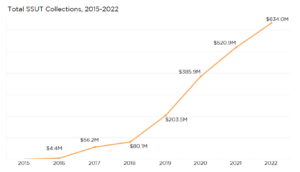Alabama’s online sales tax, known as the Simplified Sellers Use Tax (SSUT), is beginning to pay off in ways unimagined at its inception in 2016. Since that time, the program has generated $1.8 billion.
Alabama channels 50% of the SSUT collection into state budgets. Of that, 75% is directed to the General Fund while the remaining 25% benefits the Education Trust Fund. The remaining revenue is distributed among cities and counties, with allocations determined by population size.
In 2022 alone, it raked in $634 million.
A new report from the Public Affairs Research Council of Alabama questions whether changes are needed to the tax.
“Alabama’s online sales tax program is still in its infancy, but it is one of the state’s emerging revenue sources with the most growth potential,” said Ryan Hankins, executive director of PARCA.
Despite the program’s success, it currently accounts for only a small percentage of the state’s expected revenue each year. But as e-commerce continues to grow, even outpacing in-person sales — it’s expected that the SSUT’s contributions will also expand.
Yet, questions linger about the potential of the SSUT program. As Hankins puts it, “Is the SSUT collecting as much as other e-commerce tax programs could? Our analysis says not likely.”

The program has had some unexpected side effects.
The report highlights that while the SSUT has leveled the field between online vendors and brick-and-mortar stores at the state level, it has put local physical stores at a competitive price disadvantage, with the state’s average sales tax of 9.25% being higher than online purchases.
The effect is also felt in education funding. Many counties and cities dedicate part of their sales tax to public schools. However, local governments are not obligated to pass along a portion of the SSUT to schools. As of December 2022, only a handful of school systems reported receiving funding from their county’s or city’s SSUT revenue.
“As commerce increasingly moves online, the differences between the online sales tax and the traditional sales tax create more impact, particularly at the local level,” said Thomas Spencer, PARCA Senior Research Associate.
While Alabama is currently experiencing record-high tax collections, PARCA is not predicting any immediate policy changes to the SSUT program. However, the report does outline several potential reform measures for lawmakers to consider in the future, including raising SSUT’s rate to match local sales tax rates, joining the streamlined sales tax program with 24 other states, or developing a new system for online retailers to submit sales taxes based on the purchaser’s location.
As Alabama’s e-commerce landscape evolves, these could be viable steps to ensure the SSUT keeps pace.
According to PARCA, options include:
- Raising SSUT’s rate to match the prevailing local sales tax rate.
- Joining the 24 other states participating in the streamlined sales tax program.
- Building a system for online retailers to submit sales taxes based on where the purchase is made.
Grayson Everett is a staff writer for Yellowhammer News. You can follow him on Twitter @Grayson270 for coverage of the 2023 legislative session.













